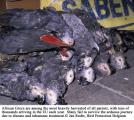European ban hurts African export industry
Monday, January 16 2006 @ 09:15 AM UTC
Contributed by: MikeSchindlinger
 Flu fear stops bird trade in countries like Mali, Guinea
Flu fear stops bird trade in countries like Mali, Guinea
BAMAKO, Mali - For these caged Senegalese parrots, chirping away their morning in captivity, a European ban to combat an Asian virus may mean freedom.
Or starvation.
In late October, a quarantined parrot from South America died in the United Kingdom from the H51N strain of the avian bird influenza, prompting the European Union to impose a blanket prohibition on the importation of all exotic birds.
The temporary ban has shuttered the bird export industry in some of Africa's poorest countries, forcing traders here in Bamako to choose between feeding birds they might never sell, or letting their investment fly away.
By HANS NICHOLS
THE ASSOCIATED PRESS
BAMAKO, Mali
The ban was set to expire Jan. 31, and European experts were to meet Jan. 11 to discuss extending it.
"A permanent ban is not foreseen for the moment," said Haravgi-Nina Papadoulaki, a European Commission press officer.
The ban has already done damage, said Malian bird exporter Amadou Sayon Keita, speaking above the competing birdsong of Senegalese parrots, rose-ringed parakeets and assorted, fluttering finches.
"It's too expensive to feed them. Many have died already, because we are not feeding them enough. They are starving," he said, calculating that it costs 5,000 Central Africa francs per day, about $10, for the millet and maize his birds require.
In a good year, Keita, a medium-sized exporter, does as much as $20,000 in trade and employs over 20 people.
Unlike the smugglers who deal in high-value and often endangered species, like rare macaws, Mali's exporters rely on volume to turn a profit.
A pair of Senegalese parrots, prized for their sweet song and electric green feathers, fetch about $5 from European pet stores.
In 1992, the United States banned the import of all exotic birds.
Like much of Mali's economy, the bird exporting business is done beneath the government's radar, hidden from tax collectors.
There are no official estimates on how large the industry is in Mali, a landlocked West-African country the size of California.
According to European Union figures, Mali led the world in exporting exotic birds in the three-month period before the ban, with 75,538 shipped to EU countries.
The top three exporters are all from sub-Saharan Africa, with neighboring Guinea exporting 52,490 birds. Tanzania, on the other side of the continent, shipped 26,315. Canada sent 14,000, the only non-African source for birds entering Europe in the top five.
Environmental groups in Europe, which have long advocated a ban on conservation grounds, welcomed the ban.
"It will completely stop the importation of small-value birds. That's what's important," said Duncan McNiven, senior investigations officer at the Royal Society for the Protection of Birds.
Yet the bulk of his conservation work is focused on endangered species and he acknowledged that many nonthreatened birds, especially in Mali, will be snared by the worldwide ban.
He also said that there was not a single case of bird flu originating in Africa and coming to Europe, either from migration or importation.
Along the banks of the Niger River, the birds are so thick that dozens can be captured in a morning with nothing more than a simple net, and the patience and quick wrists of men who have been catching birds for several generations.
The Niger River makes Mali one of the most biodiverse and bird-rich countries in Africa.
Mary Crickmore, a development officer with the Christian Reformed World Relief Committee in Bamako, said the import ban had an immediate impact on the livelihood of both the urban exporters and the men in the field who catch the birds.
However, as a member of the African Bird Club who has identified more than 500 birds in Mali, she said she supported the ban, even though she doubted the trade had much effect on the bird population.
Far more harmful to Mali's economic development, she said, are the American cotton subsidies that depress the world price.
"This bird ban, while harmful, is a drop in the bucket compared to the cotton issue," she said.
Cotton growers in West Africa and other regions complain subsidies rich nations like the United States pay their cotton farmers drive down prices, making it impossible for small family farms to compete in international markets.
Last month, World Trade Organization negotiators agreed all export subsidies on cotton be eliminated by 2006. It remained to be seen whether U.S. and other policy makers could stick to the agreement.
The politics of American and European agricultural policies - a hot topic in Mali - is of little interest to the dozens of exporters and thousand of bird catchers put out of business.
Some are making alternative plans.
After venting his frustration with the EU, Keita stepped into a small pen framed by walls of mud and straw, and posed for a photograph with a wizened tortoise.
"We will just have to export more of these. More reptiles," he said.
from:
http://www.sunherald.com/mld/thesunherald/business/13630890.htm
0 comments
http://www.freeparrots.net/article.php?story=20060116091531775
 Flu fear stops bird trade in countries like Mali, Guinea
Flu fear stops bird trade in countries like Mali, Guinea